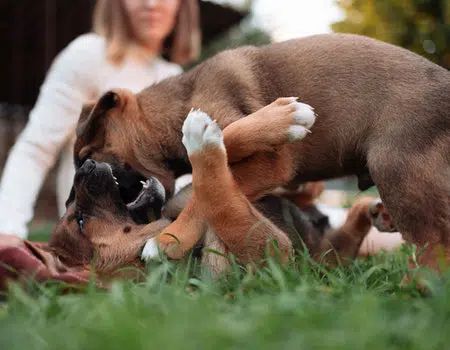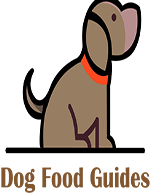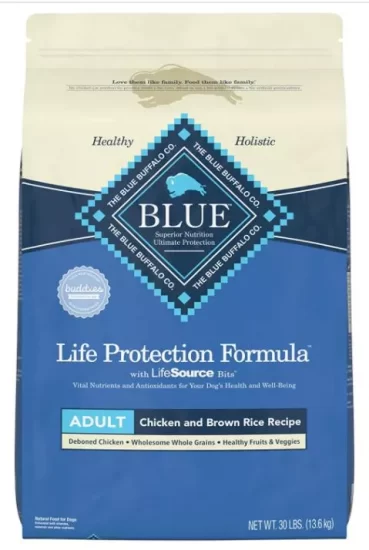This post may contain affiliate links. If you use these links to buy something we may earn a small commission. Thanks.
As dog owners, who don’t want their dogs to have a healthy weight? Unfortunately, your dog may have under its ideal weight despite eating well. They may not gain weight due to some reasons that put stress on pet parents. Your dog may even have malnourishment, which is more common to happen. But, malnourishment can also cause your dog to be underweight. Hence, feeding your dog with essentials nutrients and vitamins is necessary to help add some weight. So, how long does it take for a malnourished dog to gain weight?
Your dog can get a healthy weight depends on how much you feed it, how you provide it, and the food quality. Malnourished dogs may take up to 6 months to gain a healthy weight through dedicated care and nutrition. Read our step-by-step tips on putting weight on a malnourished dog.
Signs your dog is malnourished
There are many reasons your dog is malnourished that cause underweight. But, how do you know if your dog doesn’t have an ideal healthy weight? Your dog may be malnourished if their bones, like the spine, ribs, and pelvic bones, look prominent, and you can see the bones are visible with no trace of fat.
Malnourishment is one of many indicators that show a lack of proper nutrition. Here are some other signs your dog is malnourished.
- Lethargy and weakness
Most dogs may burst with excitement to play, while some others tend to be lazy. Lazy dogs are normal. But, it could be different if they’re lethargic. Especially if your dog is relatively young. When your dog is less energetic, the mood is generally down, and the body feels fatigued, they may be lethargic. It could be one of the signs of malnourishment.
Lethargy signs are varied depending on the level of malnourishment, age, breed, and more. Other examples of lethargy with dogs include:
Much more drained than they usually are
Disinterest in any form of play
Your dog doesn’t want to go for a walk or is not excited about it
Not participating in usual activities - Weakened immune system and frequent illness
Malnourished dogs may cause them more susceptible to illness. It’s because their immune systems are weakened. A weakened immune system makes the body unable to heal itself efficiently. If your dog gets sick, it may be challenging to fight the illness and take a long time recovering. - Slow growing and changes of coat
Healthy dogs have thick, shiny, and lush fur. Lack of protein or fat may cause dogs’ coat’s appearance to change. Their skin may become dull, dry, and sparse. Besides, they could also have hair loss in some parts of their coats. - Skin disorders
The skin often becomes the sign of illness that is first noticed. It also applies to a dog’s skin, as it’s the largest organ of the body. Insufficient nutrients can cause scaly, itchy, or flaky skin. Besides, skin is commonly seen red and irritated.
When dogs scratch irritated or dry skin, it may lead to infections with some symptoms. These include foul odor, skin is hot to touch, blisters or scabs. - Digestive problems
When you look for malnourishment in dogs, try to keep note of your dog’s digestive behavior. If your dog is often experiencing constipation or diarrhea, you may need to visit your veterinarian to be sure. Digestive problems can be signs of many health issues.
What causes malnourishment in the dog?
There are many factors why dogs experience malnourishment. It’s the most common issue for stray dogs since they lack regular and healthy meals. But, if healthy dogs have this issue, you need to determine the cause of the problem.
If you notice signs of under nutrients on your dog, here are some of the factors.
Health issues
Some diseases, like diabetes, kidney or liver disease, and inflammatory bowel disease, are some of the health issues that can cause dogs to be malnourished.
A low-quality dog food
Feeding your dog with low-quality food would unlikely meet their daily nutritional requirements. Many of these foods contain low amounts of fats and protein and have more fillers.
Parasites
Dogs can have internal and external parasites that cause malnourishment. Roundworms, hookworms, and tapeworms may live in the dog’s intestinal tract and take out the needed nutrients. Meanwhile, external parasites like fleas and ticks feed on the dog’s blood. It can cause anemia if present in large enough numbers.
How long for a malnourished dog to gain weight
There’s no definite time for dogs in gaining weight. It depends on some factors, including the reason why dogs have under ideal weight. Generally, dogs may need 3 or 4 months to gain weight up to 20 lbs on the raw diet.
Then, how long does it take for a malnourished dog to gain weight? Malnourished dogs may take up to 6 months to gain weight. Some sick dogs may gain weight immediately and then stop gaining for a week or longer. Sometimes it can be expected as the result of the dog’s body recovering. But, if your dog doesn’t gain weight within 2 weeks, we suggest you consult your veterinarian.

Malnourished dogs gain weight depending on how much food you give, how you feed them, and the food quality. Providing your dog with meat-based food and some supplements helps malnourished dogs gaining weight faster.
With some nutrition and special care, your dog can get back to a healthy weight. You can try feed dogs with 90% old food and 10% new food. Then increase the proportion of fresh food regularly until you feed it 100% new food. When your dog has a normal appetite, weight gain should take in a short time.
Tips for gaining weight on a malnourished dog
Undernourishment is something that pet parents don’t want to happen. It can cause your dog underweight. Besides, malnourishment can be severe and lead to health issues and life-threatening conditions for a dog.
If your dog is underweight, it’s essential to help them gain some pounds and reach a healthy weight. Here’s our simple guide on how to make your dog gain weight. And here are some ways to help malnourished dogs gain healthy weight.
Feed infrequent, small meals
Feeding dogs small meals frequently may be the simplest way to help them gain healthy weight. Instead of giving your dog one large part of meals once a day, feed them two meals a day in a smaller portion.
Giving large quantities of food at the same time is not recommended. It could cause vomiting or diarrhea. Even damage and death can occur when suddenly feeding your dog too much food.
Give high-calorie food
Consuming food that contains more calories will help your underweight dog. Your dog needs calories to maintain its weight, so you can give each meal more calorie-dense.
High carbohydrate foods like brown rice, cooked oatmeal, or sweet potatoes can help your dog gain weight. But, you shouldn’t feed your dog too much food that causes him to overeat and getting sick.
Add some snacks
Adding extra supplements or snacks is another way to help your malnourished dog gaining some pounds. You can mix kibble with some extra food made with meat sources, like canned food. It’s one of the ways to add some additional fat and protein. Besides, many canned food has flavor and scent that most dogs can’t resist.
Feeding your dog fresh foods
Other than canned food, you can also feed your dog with fresh food with protein, carbohydrates, or fruits. Warm food like a bowl of stew or boiled egg helps malnourished dogs gaining some weight. But, you should make sure to follow the food safety guideline to ensure your dog’s health.
High-quality all ages dog food
Most dog food for all ages in the market are created for active, athletic, and working dogs. The food contains a high amount of nutrients, protein, and fat. The high-quality ingredients in this food formula can help your malnourished or underweight dog gaining some healthy weight.
Give weight-gaining supplements
If you keep wondering how long it takes for a malnourished dog to gain weight, note that it needs time. Gaining some pounds for malnourished or underweight dogs should be slow to make sure your dog regains muscle mass and restore well-being. You can give nutritional supplements for dogs that boost vitamins, minerals, and calories. Speaking of building muscles, we have an article on how to build muscle on a Pitbull puppy.
Don’t skip exercise
Many pet parents may believe that dogs should avoid exercise to gain weight. Exercise would only burn calories, and it can be counter-productive. But, the truth is your malnourished or underweight dogs need exercise.
Taking your dog frequent walks and the chance to play regularly will make them hungry. Besides, some physical activities keep your dog stay healthy.
Avoid underfeeding and overfeeding
It’s recommended you do some research or consult with your vet for the average calorie requirements for your dog. So, you can make sure you’re feeding them properly. Take care not to underfeed or overfeed your dog.
Feeding not enough food for a dog with high energy levels and is very active could make them lose weight. But, overfeeding your dog at once can put them to some health issues. Your dog’s body will hard to process the food and can cause digestive problems and gastrointestinal distress.
Conclusion
It can be challenging taking care of a malnourished dog and help them gain some weight fast. If pet owners find some malnourishment signs on their dogs, it’s better to check the causes. Health problems, parasites, and low-quality food can be some factors that cause dogs malnourished and underweight. You can help them gain pounds in several ways.
These include feeding your dog in small amounts frequently, giving high-quality food, and keep their exercise. Then, you’ll question how long does it take for a malnourished dog to gain weight. Generally, it takes up to 6 months for malnourished and underweight dogs to gain weight. However, it’s best to consult with your vet for more guidance and recommendations.


